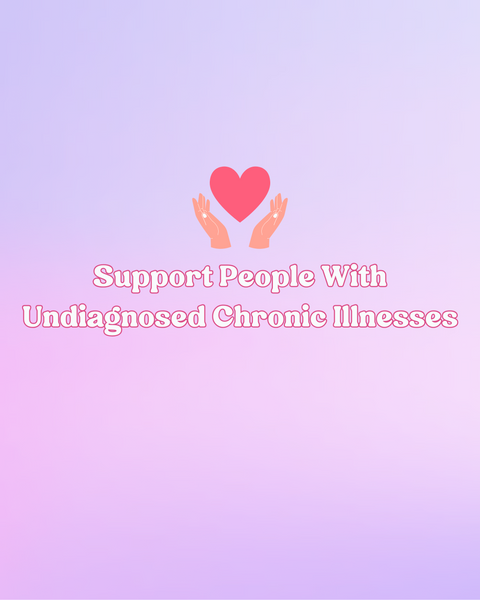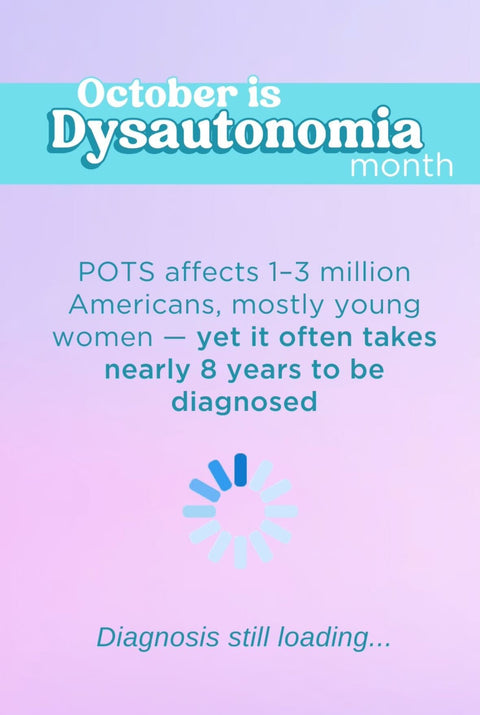For many people living with chronic symptoms like dizziness, fatigue, brain fog, or rapid heartbeat, the hardest part isn’t just the symptoms themselves—it’s the uncertainty. Millions of people live in what feels like limbo: sick enough that daily life is disrupted, but without a clear diagnosis to explain why. The path to answers can be long, frustrating, and at times lonely.
When we talk about awareness and support for conditions like Postural Orthostatic Tachycardia Syndrome (POTS), we often focus on those who have already been diagnosed. But there’s another group that deserves just as much compassion: the undiagnosed. Supporting the undiagnosed means validating their experiences, reducing isolation, and equipping them with tools to keep seeking answers.
Why So Many Remain Undiagnosed
POTS and other forms of dysautonomia are notoriously underrecognized. The average time to diagnosis for POTS is nearly eight years. During this time, many patients see multiple specialists, undergo countless tests, and often hear explanations that don’t fit—stress, anxiety, dehydration, or “just being tired.”
For women in particular, symptoms are frequently dismissed or minimized. When a patient is told repeatedly that “nothing is wrong,” they may begin to doubt themselves. This self-doubt can be as damaging as the physical symptoms, leaving people isolated and discouraged.
Being undiagnosed doesn’t mean symptoms are imaginary. It often means that awareness hasn’t yet caught up to the reality of the condition.
The Emotional Toll of Being Undiagnosed
Living without a diagnosis can be exhausting in more ways than one. Beyond the physical struggles, there’s the constant emotional weight of uncertainty. Questions like “What if this never gets better?” or “What if nobody ever believes me?” can run on a loop in someone’s mind.
Friends and family may not understand the depth of the struggle. Even well-meaning comments—“Maybe you’re just stressed” or “You should exercise more”—can leave people feeling invalidated. The result is often isolation, as those without answers withdraw to avoid judgment.
Support for the undiagnosed starts with empathy. Simply listening and believing someone’s lived experience can lift an enormous burden.
Why Support Matters Before Diagnosis
Support can make all the difference during the diagnostic journey. When people feel believed, they are more likely to keep pushing for answers. When they feel isolated, they may give up seeking care altogether.
Offering validation—“I believe you,” “Your symptoms are real,” “You deserve answers”—creates a lifeline. Even before a name is attached to the condition, patients benefit from practical support, such as help with daily tasks, encouragement at medical appointments, and access to educational resources that help them ask better questions.
Practical Ways to Support Someone Who Is Undiagnosed
Listen Without Judgment
One of the most powerful gifts you can give is your presence. Listen to their experiences without minimizing, comparing, or offering quick fixes. Sometimes the act of being heard is more healing than any advice.
Validate Their Struggle
Simple phrases like “That sounds really hard” or “I believe you” go a long way. Validation helps counteract the dismissal many undiagnosed patients have already faced.
Offer Practical Help
Daily life with undiagnosed symptoms can be unpredictable. Offering help with errands, meals, or childcare can provide much-needed relief. Small acts of service show that you see their struggle and want to lighten the load.
Accompany Them to Appointments
Navigating healthcare alone can feel intimidating. Having a friend or family member present not only provides emotional support but can also help ensure important questions get asked and answers remembered.
Share Credible Resources
Gently sharing reputable resources—like Dysautonomia International, patient advocacy organizations, or medical guides—can help someone feel more informed and empowered. Just be sure to share resources that educate, not alarm.
Tools for the Undiagnosed to Use Themselves
Support also means equipping people with strategies they can use while awaiting answers. Here are some simple, empowering tools:
Symptom Tracking: Keeping a daily log of symptoms, hydration, diet, and activity helps highlight patterns. These records can be powerful when presented to doctors.
Preparing Notes: Writing down questions and concerns before appointments makes it easier to stay focused and ensure nothing important gets left out.
Educating Themselves: While avoiding “doomscrolling,” reading credible sources builds knowledge and confidence. Understanding how the autonomic nervous system works, for example, makes it easier to describe experiences clearly.
Seeking Community: Online groups and patient forums offer not just tips but also solidarity. Realizing “I’m not the only one” can reduce isolation and instill hope.
The Power of Advocacy While Undiagnosed
Even without a formal diagnosis, self-advocacy is possible. Patients can ask providers direct questions, request referrals, and bring supporting literature to appointments. They can also speak up for their needs at school or work, explaining that while they don’t yet have a label, their symptoms are real and deserve accommodations.
Advocacy is not about being pushy. It’s about protecting health and ensuring that someone’s story is heard. Each step of advocacy moves patients closer to recognition and answers.
Creating a Culture of Support
Supporting the undiagnosed isn’t just the responsibility of family or friends. Schools, workplaces, and healthcare systems all have roles to play. Teachers can offer flexibility, employers can provide accommodations, and providers can approach patients with curiosity rather than skepticism.
When communities respond with compassion, the stigma of being undiagnosed fades. Instead of shame or self-doubt, people experience dignity and belonging—even before answers arrive.
A Message of Empowerment
If you are undiagnosed, know this: your symptoms are real, your experience is valid, and you deserve support while you search for answers. A diagnosis may bring clarity, but it is not the only measure of your worth. You are more than your symptoms, and you are not alone in this journey.
If you love someone who is undiagnosed, your role is vital. By listening, validating, and offering resources, you provide a bridge of hope. Your support can be the reason someone keeps going, keeps seeking, and eventually finds the answers they need.
Many live with symptoms but don’t yet have a diagnosis. These individuals deserve the same compassion, validation, and support as those with established conditions. Supporting the undiagnosed reduces isolation, builds confidence, and empowers people to keep seeking answers.
When we stand beside the undiagnosed, we remind them that they matter right now—not just once a diagnosis arrives. Together, through empathy, advocacy, and education, we can create a more hopeful, supportive world for everyone on the journey toward answers.




Comments (0)
There are no comments for this article. Be the first one to leave a message!